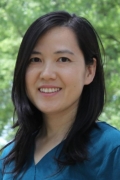Baoxia Mi is an assistant professor in the Civil and Environmental Engineering Department at the University of California, Berkeley. She received BS and MS from Tianjin University in China, Ph.D. from the University of Illinois at Urbana-Champaign, and a postdoctoral training at Yale University, all in environmental engineering. Prior to joining UC Berkeley, she held faculty positions at the University of Maryland College Park and The George Washington University in DC.
Currently, she directs the research and educational activities of the Membrane Innovation Lab, studying physicochemical and biological processes with emphases on advanced membrane processes and nanotechnology to address some of the most challenging issues in sustainable water supply and civil infrastructure, renewable energy production, and public health protection. Dr. Mi’s recent achievements include an NSF CAREER Award and Journal of Membrane Science Most Cited Author Award.
– How has your research evolved from your first to your most recent article?
My first research article was on membrane integrity monitoring method published in the early stage of my PhD study at Illinois. My current paper is on a novel graphene oxide membrane that demonstrates very interesting separation capabilities. So, over the years, the focus of my research has definitely shifted among different aspects of membrane technology, from membrane characterization to new materials and processes. But overall, I am fascinated by novel technologies that can help us address global water challenges.
– What aspect of your work are you most excited about at the moment?
I am most excited about exploring new materials and technologies with the ultimate goal of discovering their potential in promoting water and environmental sustainability. New things do not always work, but there is a lot of fun in the learning process, and the excitement that we get when it does work is enormous.
– What makes silica-crosslinked graphene oxide membranes unique?
The uniqueness of silica-crosslinked graphene oxide membrane mainly comes from its 2D carbon-walled channels, which presents a membrane structure that is distinctly different from traditional porous membranes. We believe such unique structure and associated interface phenomena eventually lead to the unexpected (in a good way) membrane behavior in removing neutral organic molecules.
– What is the most useful application for these membranes?
With its enhanced removal of organic compounds, this membrane can be potentially used for wastewater reuse, as wastewater often contains harmful organic contaminants, such as pharmaceuticals and personal care products, and endocrine disrupting compounds.
– What do you find most challenging about your research?
I felt that the most challenging part about my research is to bridge the gap between scientific discoveries in lab-scaled research and real-life applications of the technologies we are working on.
– In which upcoming conferences or events may our readers meet you?
My next trip is to the Gordon Research Conference on Membranes: Materials and Processes that will take place at Colby-Sawyer College in New London, NH next month. At the meeting, I will give a talk on the promises of graphene oxide membranes in water purification. I am also co-organizing a session on membrane processes for water-energy sustainability at the ACS meeting next Spring in San Francisco.
– How do you spend your spare time?
I spend most of my spare time with my two daughters, 8-year old Mifay and 3-month old Mibelle. If there is still time, I enjoy reading and walking/hiking.
– Which profession would you choose if you were not a scientist?
If I am not a scientist, I think I might enjoy being an elementary school teacher and/or a writer to write kids stories. My daughter always asks me to invent stories about her favorite toys and I enjoy doing it too. Nevertheless, being a scientist is much better as I would have missed the fun of doing research.
– Can you share one piece of career-related advice or wisdom with other early career scientists?
Instead of setting a definite career path for myself, I like to just try to be my best in each stage of my life. I felt that working hard and being persistent will eventually bring you to your dream job, although there could be so many different paths to follow.











